Pearls aren’t like other gemstones—they’re softer, more delicate, and uniquely organic. Whether you’ve just unwrapped a new strand of Akoya pearls or inherited a vintage South Sea necklace, knowing how to clean and care for them is essential. Both natural and cultured pearls require special attention due to their delicate nature and specific care needs. With the right approach, your pearls can maintain their luster and beauty for generations.
Yellowed pearls require gentle cleaning methods to restore their luster, but everyday substances like sweat, perfume, and even air pollution can dull or weaken pearls over time if not cleaned off properly.
In this guide, we’ll walk you through exactly how to clean pearls safely at home, how often you should do it, what to avoid, and how to store and protect them long-term. Whether you wear your pearls every day or only on special occasions, these tips will help you keep them looking their best.
Pearls are unlike most gemstones—they’re organic, formed inside oysters or mussels through layers of nacre. This natural material gives pearls their luminous glow, but also makes them soft and porous. Pearls are made of organic material, which can decompose over time.
On the Mohs scale of hardness, pearls rank between 2.5 and 4.5—far lower than diamonds or rubies—making them more susceptible to scratches and surface damage. They also absorb substances like skin oils, acids, and cosmetics, which can dull their shine over time.
Even the silk thread used to string many pearl necklaces is frag, easily stretched or weakened by moisture. That’s why cleaning pearls requires a gentle, preventative approach—not soaking, scrubbing, or harsh chemicals.
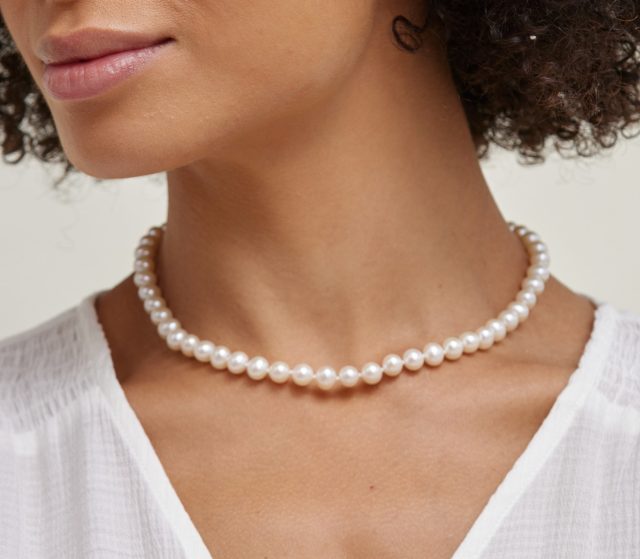
You don’t need any fancy tools or expensive products to clean pearls. Just a few gentle, everyday items like gentle soap (such as mild dish soap), mixed with lukewarm water is enough to gently clean visible stains. In fact, using the wrong cleaning supplies can actually do more harm than good. When it comes to pearl care, less is more. It is important to select gentle cleaning solutions to ensure the preservation of both the pearls and the cleaner’s safety.
This is the most important item in your pearl care kit. A clean, non-abrasive cloth (like microfiber or flannel) is ideal for wiping down your pearls after each wear. This removes sweat, body oils, and environmental residue that can dull their shine.
Pro tip: Keep a soft cloth in your jewelry box to remind yourself to wipe your pearls down before storing them.
When it’s time for a deeper clean, you’ll want a gentle, fragrance-free soap. Look for mild dishwashing liquid or baby shampoo—avoid anything labeled “antibacterial,” as these formulas can be too harsh.
Avoid: Soaps with added moisturizers, exfoliants, or citrus oils.
Use room temperature or slightly warm water. Too hot or too cold can shock the nacre and damage delicate silk threads. If your tap water is particularly hard (high in minerals), consider using distilled water to avoid residue.
Use this to mix your soap and water solution. Never run your pearls directly under the faucet—this can put stress on the silk string or accidentally introduce too much water.
Lay your pearls flat on a towel to air dry completely to prevent damage. Make sure it’s clean, soft, and placed on a flat surface. This helps the pearls keep their shape and protects the thread from stretching.
To keep your pearls in perfect condition, steer clear of these common cleaning tools and substances:
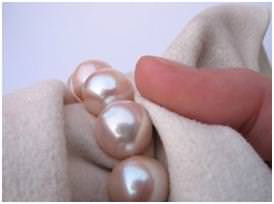
While pearls may feel smooth and sturdy in your hand, their delicate nacre requires an extremely gentle touch. Regular cleaning helps preserve their natural beauty, but it’s important to do it the right way—without causing unnecessary wear or damage.
Below is a detailed, safe method for cleaning pearl jewelry at home:
In a small bowl, mix a few drops of mild, fragrance-free soap with lukewarm water. You’re not looking for bubbles or foam—a little soap goes a long way.
Why it matters: Strong detergents, especially those with added scents, dyes, or disinfectants, can strip away the natural sheen of your pearls. Lukewarm water is gentle on both the nacre and the silk thread.
Dip a soft, lint-free cloth into the soapy solution. Wring it out until it’s just damp—not dripping wet. Excess moisture can damage the silk string that holds most pearl necklaces together.
Using the damp cloth, gently wipe each pearl one at a time. Move in small, circular motions, being careful not to tug or press too hard.
Rinse your cloth with clean, lukewarm water (no soap), and wipe down the pearls again to remove any leftover residue. Make sure the cloth is just lightly damp—not soaked.
Lay the pearls flat on a clean, dry towel. Allow them to air dry completely in a cool, shaded area to prevent damage—this can take several hours depending on humidity. Avoid using a blow dryer, heater, or direct sunlight, and never hang a pearl necklace to dry as gravity can stretch the silk thread.
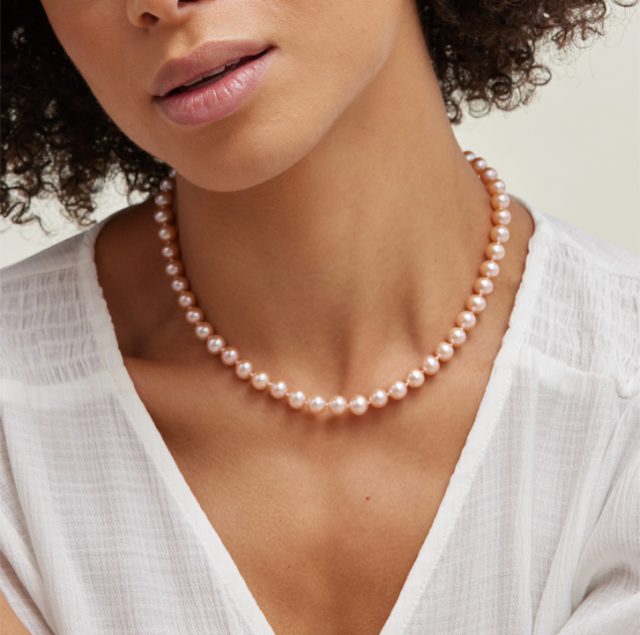
Cleaning is just one part of pearl care—how you store and protect your pearls afterward is just as important. Proper aftercare helps preserve the natural luster of your pearls, prevent accidental damage, and extend the life of the silk string they’re often strung on. Pearl maintenance is crucial for preserving their beauty and longevity, ensuring they remain cherished heirlooms.
Pearls are surprisingly sensitive to their surroundings—even how you store them can impact their longevity. When storing your pearls, always keep them in a soft cloth or pouch to avoid scratches. Protect pearls by using materials like silk or velvet for wrapping and ensure they are kept away from chemicals and heavy objects to prevent damage. Here’s how to do it right:
Pearl bracelets and necklaces, in particular, should be stored in a soft pouch or lined jewelry box to prevent damage and maintain their delicate strands. Wrap your pearls in a soft cloth if you’re storing them for longer periods to add an extra layer of protection against dust, scratches, and humidity changes.
One of the most surprising facts about pearls? They benefit from being worn.
The natural oils in your skin can help maintain the moisture and glow of pearls—just be sure to wipe them down after each wear.
But that doesn’t mean they love all moisture. Exposure to sweat, perfume, hair products, and sunscreen can be harmful. So, always make pearls the last thing you put on, and the first thing you take off.
Even with the best intentions, it’s easy to make mistakes when cleaning pearls. Proper care ensures that pearls remain beautiful and cherished items in your jewelry collection. Here are a few of the most common missteps—and why they’re problematic:
How frequently you clean your pearls depends on how often you wear them:
Sometimes, pearls need more than a simple at-home clean. Here’s when to see a pro cleaner:
Restringing tip:
If you wear your pearl necklace often, aim to have it professionally restrung every 1–2 years. Look for knotted stringing between each pearl, which prevents rubbing and adds security.
A trusted jeweler can clean your pearls with industry-approved methods and help restore their original glow—without putting them at risk.
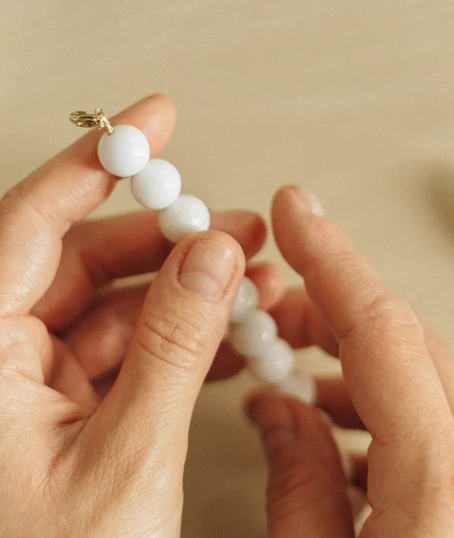
We’ve covered the basics, but here are some quick answers to the most commonly asked pearl cleaning questions:
Can you clean your pearls with baking soda?
No. Baking soda is abrasive and can damage the delicate nacre of the pearl, causing it to dull or scratch.
What if my pearl jewelry includes gold, diamonds, or other stones?
Spot-clean around the other elements, avoiding direct moisture on the metal or stones. For mixed-material pieces, a jeweler can safely clean the entire piece without compromising any component.
Is there a safe pearl cleaning spray?
Most jewelry sprays are formulated for metal or diamonds. If you’re using any spray product, make sure it’s specifically labeled as safe for pearls. When in doubt—stick with soap and water.
Can I use a toothbrush on pearls?
No. Even the softest toothbrush can leave micro-abrasions on the pearl’s surface. Use a soft cloth or a clean makeup brush instead.
Can I use jewelry wipes to clean pearls?
Most pre-packaged wipes are too harsh for pearls. They often contain alcohol or chemicals that can damage nacre. Stick with a damp cloth and mild soap.
Do pearls go bad or expire?
Not exactly—but pearls can deteriorate over time without proper care. Dullness, yellowing, or flaking can occur if pearls are stored improperly or exposed to harsh elements.
With just a little extra care, your gorgeous pieces from The Pearl Source can remain as stunning and luminous as the day you got them. From regular gentle cleaning to proper storage, these simple steps protect your pearls’ fine surface and ensure they stay a cherished part of your collection.
Now you know how to look after these organic gemstones, it’s time to build your jewelry collection! Explore pearl jewelry, from classic pearl necklaces to modern baroque pieces, and enjoy their unique luster for life.
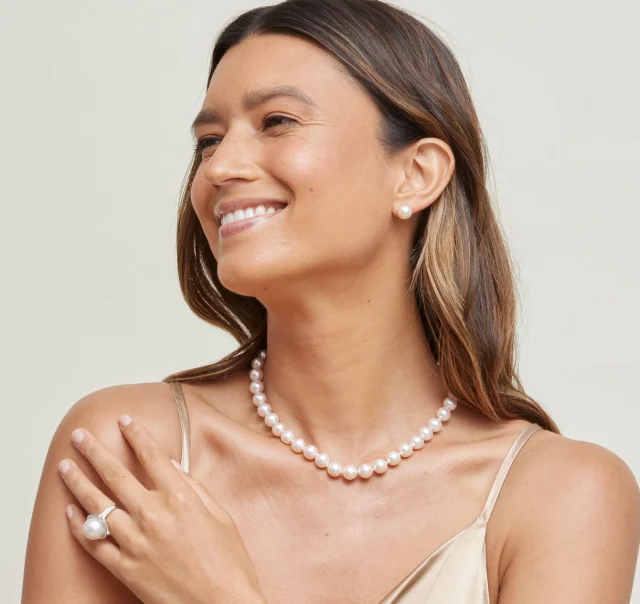
Signup now and receive an email once I publish new content.

Content Writer and Editor at The PearlSource
Kate Muirhead is the editor and content writer for leading pearl retailer The Pearl Source. She believes in the power of signature jewelry, and that collecting it is half the fun.
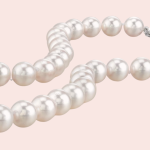 Learn from the Best: Our GIA Pearl Specialist, Lauren
Learn from the Best: Our GIA Pearl Specialist, Lauren